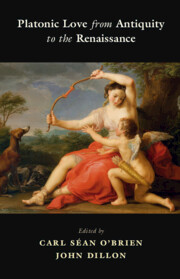Book contents
- Platonic Love from Antiquity to the Renaissance
- Platonic Love from Antiquity to the Renaissance
- Copyright page
- Contents
- Acknowledgements
- Notes on Contributors
- Introduction
- Part I Love in Plato
- Part II Development of Platonic Love in Antiquity
- Part III Love and Metaphysics during the Middle Ages
- Part IV Platonic Love during the Renaissance
- Chapter 12 Human and Divine Love in Marsilio Ficino
- Chapter 13 Marsilio Ficino and Leone Ebreo on Beauty
- Chapter 14 Pico della Mirandola on Platonic Love
- Chapter 15 The Contra-Amorem Tradition in the Renaissance
- Chapter 16 Castiglione and Platonic Love
- Chapter 17 Platonic Love in Renaissance Discussions of Friendship
- Bibliography
- Subject Index
- Index Locorum
Chapter 17 - Platonic Love in Renaissance Discussions of Friendship
from Part IV - Platonic Love during the Renaissance
Published online by Cambridge University Press: 25 August 2022
- Platonic Love from Antiquity to the Renaissance
- Platonic Love from Antiquity to the Renaissance
- Copyright page
- Contents
- Acknowledgements
- Notes on Contributors
- Introduction
- Part I Love in Plato
- Part II Development of Platonic Love in Antiquity
- Part III Love and Metaphysics during the Middle Ages
- Part IV Platonic Love during the Renaissance
- Chapter 12 Human and Divine Love in Marsilio Ficino
- Chapter 13 Marsilio Ficino and Leone Ebreo on Beauty
- Chapter 14 Pico della Mirandola on Platonic Love
- Chapter 15 The Contra-Amorem Tradition in the Renaissance
- Chapter 16 Castiglione and Platonic Love
- Chapter 17 Platonic Love in Renaissance Discussions of Friendship
- Bibliography
- Subject Index
- Index Locorum
Summary
Elite friendship discourse in the Renaissance was shaped by a set of commonplaces inherited from classical antiquity according to which friends were virtuous, male, and few in number, and their relationships egalitarian and non-sexual. Neoplatonic love had the power to disrupt many of these received ideas. Ficino’s account of male friendship in his Lysis commentary emphasized the importance of spiritual desire in initiating relationships and foregrounded a pedagogical dimension more in keeping with a chaste version of Greek pederasty than the non-hierarchical models of friendship inherited from Aristotle and Cicero. In a poem on the Platonic androgyne, Antoine Héroët used the language of friendship to describe heterosexual unions as offering a potential step towards union with God. Bonaventure des Périers warned instead of the dangers of earthly erotic entanglements in a verse commentary to his translation of Plato’s Lysis, thereby concurring with the beliefs of his benefactor Marguerite de Navarre while suggesting that female community might offer the soul some solace before death provided the possibility of joining with God. Finally, Montaigne’s unorthodox account of his relationship with his deceased friend La Boétie engaged with the Neoplatonic tradition while eschewing the possibility it might facilitate spiritual ascent.
- Type
- Chapter
- Information
- Platonic Love from Antiquity to the Renaissance , pp. 275 - 288Publisher: Cambridge University PressPrint publication year: 2022

